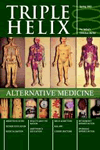Written by Marine Commando Nigel Mumford following the reported miraculous healing of his sister, this book covers the story of his journey through which he overcame disorders such as posttraumatic stress syndrome to become a minister of healing. As the reviewer, I have two relatives with chronic, incurable diseases - an infant with Cystic Fibrosis and a young mother with progressive Multiple Sclerosis. I write this with them in mind.
The biblical basis for the author's ministry is typical of the genre: 'We are commanded to preach the kingdom and heal the sick' (p64). There is no reference to the next phrase, 'raise the dead', or to the command not to take the Gospel to the Gentiles (Matthew 10:5-10). The Great Commission of Matthew 28 gives a very different mandate. Mumford quotes 1 Corinthians 12:4-12, writing, 'I believe that we are all, without exception, given gifts of healing' (p124). This is the exact opposite of the central point that the apostle Paul is making in this passage; different gifts are given to different Christians for the common good.
The author then goes on to say, '[James 5:14- 16] offers, in my opinion, the biblical root of the healing ministry…these words need to be read and re-read to know this is where the journey of healing begins. It incorporates the laying on of hands…' (p120). This passage, however, does not mention the laying on of hands but rather anointing with oil and praying by the elders.
Even in his treatment of the Gospel, Mumford appears to be muddled: 'God sees us as perfect creatures', (p40) but he then says, 'The past is gone. We may still have our guilt but with God's help we can let go of the pain' (p112). He has little to say about the Cross or forgiveness of our sins, even in his prayers. He does not distinguish Christ's miracles from ours, and asks how we can carry out the healing ministry of Jesus (p123).
There is no medical documentation on the medical cases. A kidney stone passes naturally, avoiding an operation. A clinical diagnosis is not confirmed by investigations. His 'best case' is an infant with bowel obstruction due to a (umbilical?) hernia. It resolved spontaneously (p105). While he claims the benefit of prayer can never be scientifically proven (p46), I would suggest that these are everyday medical events. In a section strangely entitled, 'Why are some healed and others cured?', he focuses on a five-month-old baby with Cystic Fibrosis. As he prayed, the sun came out and shone on the child. 'It was to me as if God was sending us a message of hope'. It is not clear what he means by this and he appears to have no understanding of incurable diseases. I think this book is naïve, deeply subjective and seriously unhelpful.
Reviewed by
Peter May
General Practitioner in Southampton































